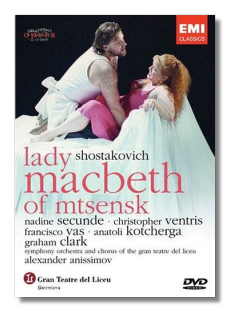
The Internet's Premier Classical Music Source
Related Links
- Shostakovich Reviews
- Latest Reviews
- More Reviews
-
By Composer
-
Collections
DVD & Blu-ray
Books
Concert Reviews
Articles/Interviews
Software
Audio
Search Amazon
Recommended Links
Site News
 DVD Review
DVD Review
Dmitri Shostakovich

Lady Macbeth of Mtsensk
- Nadine Secunde (Katerina Ismailova)
- Christopher Ventris (Sergey)
- Anatoli Kotcherga (Boris Ismailov)
- Francisco Vas (Zinoviy Ismailov)
- Graham Clark (Shabby Peasant)
- Mireille Capelle (Aksinya)
- Nino Surguladze (Sonyetka)
- Juha Kotilainen (Chief of Police)
- John Hurst (Teacher)
- Maxim Mikhailov (Priest)
- Yevgeny Nesterenko (Old Convict)
Symphony Orchestra and Chorus of the Gran Teatre del Liceu/Alexander Anissimov
EMI Classics DVB 5 99730 9 2DVDs 187 minutes Widescreen LPCM Stereo, DTS, Dolby Digital
There must have been a sale on beds in Barcelona, judging from Stein Winge's production of Lady Macbeth, with set design by Benoit Dugardyn. Katia Ismailova's bed never quite disappears from stage during the first part of the opera, even in scenes set in the outdoors. In the second part, the beds multiply in the police station (it must be the barracks), but they disappear in the last two scenes. The entire opera appears to take place in a giant warehouse. But these are not the most drastic innovations. Shostakovich's four-act structure has been altered: now the opera is given with one pause only, and that is after the Shabby Peasant's discovery of Zinoviy's corpse in the cellar. This probably taxed the audience in the Gran Teatre del Liceu, although it is easier to digest at home. Furthermore, Zinoviy is strangled, rather than being struck with a candlestick, and, in the last scene, rather than pushing Sonyetka into the freezing river, Katerina merely suffocates her with a plastic shopping bag, before lapsing back into a catatonic state. During the orchestral interludes, the curtain remains up and characters mime to the music. Winge seems to have conceived of Lady Macbeth as the Russian answer to Bertolt Brecht, or perhaps to Wozzeck or Lulu. Staged literally, this opera is already cynical, but this production, recorded in the Liceu in May 2002, makes it even more cynical. In spite of its eccentricities, Winge's production works – it's not outrageous for the sake of outrageousness – but it will raise some eyebrows.
There's a good cast at work here. Secunde has tremendous stamina and is a formidable presence onstage. Her voice might not be the most beautiful, but this role doesn't attract linnet-voiced sopranos anyway, and she seems unfazed by its rigors. As her lover Sergey, tenor Ventris is both sexy and loutish, and he is an excellent foil for Secunde. While too young in appearance, Kotcherga is effective as Katerina's brutal father-in-law, and Vas captures her husband's ineffectual bluster to perfection. In the smaller roles, veteran Nesterenko (quavery of voice but authoritative anyway) deserves mention as the Old Convict, and Surguladze – while much too pretty to be a convict – brings a gorgeous voice to Sonyetka. As the Shabby Peasant, Clark carries on like a Marx Brother (not Karl!), nearly stealing the show in his scenes of drunkenness. The chorus is given lots to do here – almost as if they were on Broadway – and the orchestra plays idiomatically. Anissimov has made true Russians out of his international cast, which, by the way, is huge. Although the leads must be strong in this opera, it's also an ensemble piece, and this production works on both levels.
Production values are high – both sound (LPCM Stereo, DTS Surround, and Dolby Digital Surround) and the picture (16:9 format) are excellent. The English subtitles are helpful, although they will be more helpful to British viewers. (Americans will run to the dictionary to find out what a "pong" is – a nasty smell.) There is no bonus material.
Lady Macbeth of Mtsensk may be negative and depressing, but it's still a great opera. Despite the oddities of this production, Winge has successfully answered the many staging challenges that this opera presents, and the performances are uniformly excellent.
Copyright © 2004, Raymond Tuttle



















